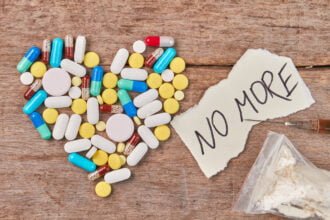The U.S. Office of Disease Prevention and Health Promotion reports that at least 20 million people struggle with addiction. Unfortunately, one of the reasons so many people struggle with addiction is that they don’t know what to do to overcome their problem.
Addiction recovery is a challenging and complex process that requires much effort and commitment from individuals who struggle with substance use disorders or behavioral addiction. The road to recovery is often marked by numerous obstacles and difficulties that can pose significant challenges to those seeking to overcome their addiction.
There are a lot of challenges during the addiction recovery process. One of the most important things to recognize is that people often have difficulty recognizing when a loved one is suffering from addiction. Even after that is accomplished, it can be difficult to help them get the support that they need.
For individuals seeking addiction recovery, an intensive outpatient program (IOP) nearby can provide a valuable resource in their journey toward sobriety. You can learn more about these addiction treatment programs here. The structured treatment and support offered in an IOP help individuals overcome the challenges and obstacles they may encounter during recovery. Additionally, IOPs provide a more convenient and accessible option for individuals who cannot commit to a full-time inpatient program or need to continue working or attending school while receiving treatment.
One of the primary benefits of an IOP nearby is that it allows individuals to receive intensive treatment while still maintaining their daily routine. This can be especially beneficial for those who have responsibilities such as work or family obligations that make it difficult to commit to a residential treatment program. Additionally, the availability of support from family and friends in the community can strengthen the individual’s support network and increase the likelihood of successful long-term recovery.
Overall, an IOP nearby can be a crucial component in an individual’s addiction recovery journey, providing necessary resources and support to help them overcome the obstacles and challenges they may face. Individuals can recover and regain control over their lives with determination, commitment, and support.
Some of the potential challenges that individuals in addiction recovery may face include the following:
Withdrawal Symptoms: The early stages of withdrawal symptoms are one of the most significant challenges individuals in addiction recovery face. These symptoms, which can be both physical and psychological, can be extremely unpleasant and difficult to manage. Individuals addicted to opioids, for example, may experience severe withdrawal symptoms such as severe abdominal pain, nausea, vomiting, and diarrhea. These symptoms can be complicated to manage, making it difficult for people to stick to their recovery program.
Relapse: Another significant challenge people in addiction recovery may face is relapse. Individuals relapse after a period of sobriety when they return to their addictive behavior. This can be a significant setback in the recovery process, making it difficult for individuals to reclaim control of their lives. A combination of factors, such as triggers, cravings, and stress, frequently causes relapse. Individuals in addiction recovery must learn how to manage their triggers, identify and avoid high-risk situations, and develop robust coping mechanisms to manage their cravings and stress to reduce the risk of relapse.
Mental Health Issues: Many people who struggle with addiction also have underlying mental health issues like depression, anxiety, and trauma. These issues can exacerbate the symptoms of addiction and make it more difficult for individuals to overcome their dependence, making the recovery process even more difficult. Individuals in recovery from addiction must address their mental health issues to achieve long-term recovery and avoid relapse. They need to heal their brain after suffering from addiction.
Social Stigma: Another issue that people in addiction recovery may face is the social stigma associated with addiction. This stigma can make it difficult for individuals to seek help and maintain their recovery once they have achieved it. Individuals in addiction recovery must work to educate others about the realities of addiction and the challenges that individuals in recovery face to overcome this stigma.
Lack of Support: Many people in addiction recovery may lack support from friends and family. Individuals may feel isolated and alone due to the lack of support, making recovering difficult. Individuals in addiction recovery must develop a strong support network of friends and family members who can provide them with the support and encouragement they require to achieve long-term recovery.
Difficulty Finding Employment: Individuals in addiction recovery may also face difficulties finding work. This could be because of the stigma associated with addiction, as well as the impact addiction has had on their work history and skills. Individuals in addiction recovery must work to develop their skills and build a positive work history, as well as seek employment opportunities that support their recovery to overcome this challenge.
Financial Struggles: Addiction can seriously impact a person, leaving them with significant debts and other financial obligations. This can make it difficult for individuals in addiction recovery to make ends meet and maintain their recovery. Individuals in addiction recovery must work to manage their finances, reduce their debts, and develop a solid financial plan for the future to overcome this challenge.
These are just some potential challenges that individuals in addiction recovery may face. Overcoming these challenges requires much effort, dedication, and support. It is crucial for individuals in
What are some of the physical withdrawal symptoms that individuals in addiction recovery may face?
Individuals in addiction recovery may face a range of physical withdrawal symptoms, depending on the substance they were addicted to. Some common physical withdrawal symptoms include:
- Headaches
- Nausea and vomiting
- Shaking and tremors
- Sweating
- Insomnia or disrupted sleep patterns
- Fatigue
- Muscle aches and cramps
- Increased heart rate
- High blood pressure
- Changes in appetite and weight
It is important to remember that these symptoms can be severe, making it difficult for people in addiction recovery to stick to their treatment plan. Individuals in recovery should seek professional medical help to manage withdrawal symptoms and ensure safety during this process.
How can individuals in addiction recovery manage their mental health issues?
Individuals in addiction recovery can manage their mental health issues by incorporating several strategies into their recovery plan, including:
Therapy: Attending individual or group therapy can provide a safe and supportive environment to address any underlying mental health issues and develop healthy coping mechanisms.
Medication: In some cases, medication may be prescribed by a healthcare professional to manage symptoms of mental health conditions such as depression, anxiety, or bipolar disorder.
Self-care: Engaging in self-care activities, such as exercise, mindfulness practices, and hobbies, can help improve overall mental health and well-being.
Support groups: Joining a support group, such as a 12-step program or a peer-led group, can provide individuals in addiction recovery with a sense of community and a safe space to discuss their mental health and recovery journey.
Healthy relationships: Building and maintaining healthy relationships with friends, family, and support systems can help provide emotional support and a sense of connection.
Sleep and nutrition: Sleeping and maintaining a balanced diet can also positively impact mental health.
Mindfulness practices: Engaging in mindfulness practices, such as meditation and deep breathing, can help reduce stress and improve overall well-being.
Individuals in addiction recovery should collaborate with a healthcare professional or a therapist to create a personalized plan for managing their mental health issues and to ensure that their recovery plan is comprehensive and effective.
Individuals in addiction recovery must also be patient with themselves and recognize that recovery is a process that takes time and effort. Some days may be better than others, and it is natural for them to go through ups and downs as they work through their mental health issues.
Individuals in addiction recovery can work toward long-term recovery and improved well-being by taking care of their mental health and seeking help when needed. It is also vital to seek assistance if necessary. This may entail contacting a support system, a mental health professional, or a crisis hotline.
Individuals in addiction recovery must also be proactive about their mental health and take steps to avoid relapse. Some examples are avoiding triggers, developing healthy coping mechanisms, and seeking support from friends, family, or a support group.
Moreover, people in addiction recovery must recognize the link between their addiction and their mental health and address both issues as part of their recovery plan. Doing so can improve their chances of long-term recovery and overall well-being.










